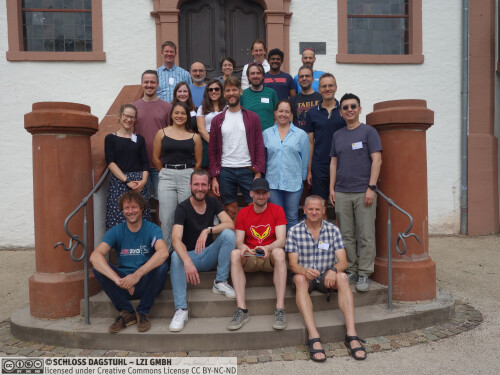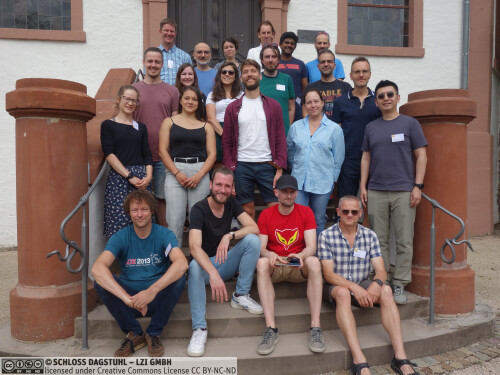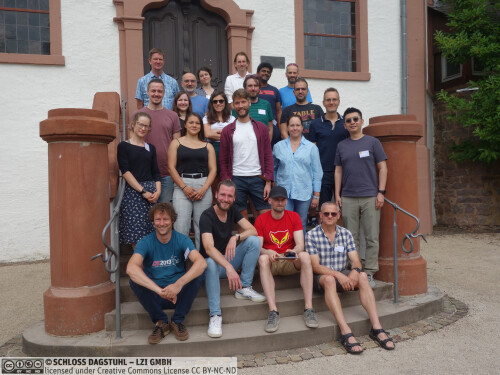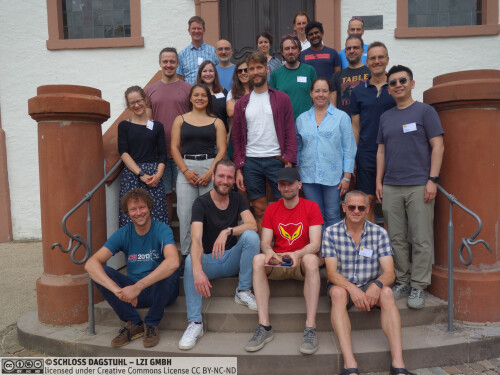Dagstuhl-Seminar 23292
SportsHCI
( 16. Jul – 21. Jul, 2023 )
Permalink
Organisatoren
- Carine Lallemand (University of Luxembourg, LU)
- Florian 'Floyd' Mueller (Monash University - Clayton, AU)
- Dennis Reidsma (University of Twente - Enschede, NL)
- Elise van den Hoven (University of Technology - Sydney, AU)
Kontakt
- Marsha Kleinbauer (für wissenschaftliche Fragen)
- Susanne Bach-Bernhard (für administrative Fragen)
Impacts
- Grand Challenges in SportsHCI : Proceedings of the CHI Conference on Human Factors in Computing Systems (CHI ’24), May 11–16, 2024 - Elvitigala, Don Samitha; Karahanoğlu, Armağan; Matviienko, Andrii; Reidsma, Dennis; Lallemand, Carine; Bernhaupt, Regina; Patibanda, Rakesh; Montoya, Maria F.; Vidal, Laia Turmo; Postma, Dees; Jones, Michael; Harrison, Daniel; Elbæk, Lars; Daiber, Florian; Burr, Lisa Anneke; Buono, Paolo; Hämäläinen, Perttu; Delden, Robby van; Ren, Xipei; Rheden, Vincent van; Zambetta, Fabio; Hoven, Elise van den; Mueller, Florian 'Floyd' - New York : ACM, 2024, - 20 pp..
- From Metrics to Experiences : Investigating How Sport Data Shapes the Social Context, Self-Determination and Motivation of Athletes - Postma, Dees; Reidsma, Dennis; Delden, Robby van; Karahanoğlu, Armağan - Oxford : Oxford University Press, 2024. - pp. 1-15.
- Why Movement-Based Design!? : Exploring Methods and Experiences in MBD : article in DIS '24 Companion: Companion Publication of the 2024 ACM Designing Interactive Systems Conference - Rheden, Vincent van; Reidsma, Dennis; Elbæk, Lars; Lallemand, Carine; Mueller, Florian 'Floyd'; Zambetta, Fabio; Daiber, Florian; Elvitigala, Don Samitha; Vidal, Laia Turmo - New York : ACM, 2024. - Pages 453 - 457.
- Grand Challenges in SportsHCI : article in Proceedings of the CHI Conference on Human Factors in Computing Systems (CHI ’24), May 11–16, 2024 - Elvitigala, Don Samitha; Karahanoğlu, Armağan; Matviienko, Andrii; Reidsma, Dennis; Lallemand, Carine; Bernhaupt, Regina; Patibanda, Rakesh; Montoya, Maria F.; Vidal, Laia Turmo; Postma, Dees; Jones, Michael; Harrison, Daniel; Elbæk, Lars; Daiber, Florian; Burr, Lisa Anneke; Buono, Paolo; Hämäläinen, Perttu; Delden, Robby van; Ren, Xipei; Rheden, Vincent van; Zambetta, Fabio; Hoven, Elise van den; Mueller, Florian 'Floyd' - New York : ACM, 2024. - Pages 1 - 20.
- The first SportsHCI conference.
In July 2023, a seminar took place in which 22 researchers and academics from across the world gathered for a week in Schloss Dagstuhl, Saarland, Germany, to discuss the future of the design of interactive systems to support sport and exercise activity, concerning the emerging field of "SportsHCI". The following report documents the seminar and the efforts of the participants to investigate the underlying gaps in developing interactive technologies for sports by Human-Computer Interaction (HCI) practitioners, as well as knowledge guiding the design of such technologies, and the challenges the field of SportsHCI faces moving forward.
Interactive systems are increasingly used to support sports and physical exercise activities, not only for functional purposes, such as sensing achievements to determine personal records but also for experiential reasons, such as highlighting the joy of movement, aiming to enrich the sports experience. The result is a surge in human-computer interaction systems for sports, such as sports watches that not only optimize runners' athletic training plans but also provide beat-adjusted music for entertainment, augmented reality systems in stadiums to support the audience experience, and AI-enhanced capture systems to allow parents to watch their kids play soccer from afar in real-time. We call the resulting field "SportsHCI".
A growing body of sensors, devices, and systems support these SportsHCI applications, allowing people to engage with athletic performance in novel and interesting ways, extending the field of HCI beyond the mouse and keyboard paradigm. Unfortunately, what is missing, though, is a thorough understanding of how to design such SportsHCI systems in a systematic way. This is in part due to a lack of a theoretical framework that is concerned with the coming together of computing and the physically active human body in a way that incorporates and integrates all aspects of movement, performance, learning, and experience, and a lack of understanding of how this combination has implications for how we approach the design of SportsHCI. It seems reasonable to assume that efforts that aim to address this could help people to engage more in physical activity and make high performance more accessible, and maybe even reach previously unengaged people, motivating them to try physical activity, so that ultimately, more people profit from the many physical, social, and mental health benefits sport and exercise activity can provide.
This Dagstuhl Seminar built on prior work that highlighted that supporting sport and exercise activities with technology should not only be concerned with functional aspects, such as measuring and comparing athletic performance, but it should also consider the experiential aspects, in other words, for example, how do sports people feel about their athletic performance. Therefore, this seminar invited experts from across the world and with different backgrounds, who understand that successful sport and exercise activity-support technology needs to be designed also with this experiential perspective in mind, and seek to develop guidance on how to support it. This seminar invited experts from both industry and academia, including experts from sports science as well as HCI and design, to work towards several large goals, including the identification of grand challenges in SportsHCI, so that a coherent approach could be developed to help more people profit from the benefits of sports and physical exercise.
There were several main outcomes of the Dagstuhl Seminar. The most notable of these are: a draft Grand Challenges paper was outlined, which since then has been finalised and submitted to a major conference in the field; an outline was made for a large Marie Curie grant proposal that accommodates all participants in the seminar; a proposal and call for papers have been drafted for a special issue in one of the major journals in the field; and plans have been laid for setting up, over the course of the coming two years, a separate international conference dedicated to the topic of this seminar. Furthermore, additional papers have been identified that could be developed jointly on the basis of the work done in this seminar. For all these points, concrete community actions were identified, and participants volunteered to take the lead on those actions, thus ensuring followup on the ideas developed during the seminar. Indeed, since finalizing the seminar, several of these action points have already been further taken up.
 Florian 'Floyd' Mueller, Carine Lallemand, Dennis Reidsma, and Elise van den Hoven
Florian 'Floyd' Mueller, Carine Lallemand, Dennis Reidsma, and Elise van den Hoven
Interactive systems are increasingly used to support sports and physical exercise activities, not only for functional purposes, such as sensing achievements to determine personal records, but also for experiential reasons, such as highlighting the joy of movement, aiming to enrich the sports experience. The result is a surge in human-computer interaction systems for sports, such as sports watches that not only optimize runner’s athletic training plans but also provide beat-adjusted music for entertainment, augmented reality systems in stadiums to support the audience experience, and AI-enhanced capture systems to allow remote parents watch their kids play soccer from afar. We call the resulting field “SportsHCI”.
A growing body of sensors, devices, and systems support these SportsHCI applications, allowing people to engage with athletic performance in novel and interesting ways, extending the field of HCI beyond the mouse and keyboard paradigm. Unfortunately, what is missing, though, is a thorough understanding of how to design such SportsHCI systems in a systematic way. This is in part due to a lack of a theoretical framework that is concerned with the coming together of computing and the physically active human body in a way that incorporates and integrates all aspects of movement, performance, learning, and experience, and a lack of understanding of how this combination has implications for how we approach the design of SportsHCI. It seems reasonable to assume that efforts that aim to address this could help people to engage more in physical activity, and maybe even reach previously unengaged people, motivating them to try physical activity, so that ultimately, more people profit from the many physical, social and mental health benefits sport and exercise activity can provide.
This Dagstuhl Seminar builds on prior work that highlighted that supporting sport and exercise activities with technology should not only be concerned with functional aspects, such as measuring and comparing athletic performance, but also consider the experiential aspects, in other words, how sports people feel about their athletic performance. Therefore, the seminar brings together researchers and industry members who understand that successful sport and exercise activity-support technology needs to be designed with also this experiential perspective in mind, and seek to develop guidance on how to support it. This seminar invites experts from both industry and academia, including experts from sports science as well as HCI and design experts, to work towards identifying the grand challenges in SportsHCI so that a coherent approach can be developed in order to help more people profit from the benefits of sports and physical exercise.
 Carine Lallemand, Florian 'Floyd' Mueller, Dennis Reidsma, and Elise van den Hoven
Carine Lallemand, Florian 'Floyd' Mueller, Dennis Reidsma, and Elise van den Hoven
- Regina Bernhaupt (TU Eindhoven, NL) [dblp]
- Paolo Buono (University of Bari, IT) [dblp]
- Lisa Anneke Burr (Paris Lodron Universität Salzburg, AT) [dblp]
- Florian Daiber (DFKI - Saarbrücken, DE) [dblp]
- Lars Elbaek (University of Southern Denmark - Odense, DK) [dblp]
- Don Samitha Elvitigala (Monash University - Clayton, AU) [dblp]
- Perttu Hämäläinen (Aalto University, FI) [dblp]
- Daniel Harrison (University of Northumbria - Newcastle, GB) [dblp]
- Michael Jones (Brigham Young Univ., US) [dblp]
- Armagan Karahanoglu (University of Twente, NL) [dblp]
- Carine Lallemand (University of Luxembourg, LU) [dblp]
- Andrii Matviienko (KTH Royal Institute of Technology - Stockholm, SE) [dblp]
- Maria Fernanda Montoya Vega (Monash University - Clayton, AU) [dblp]
- Florian 'Floyd' Mueller (Monash University - Clayton, AU) [dblp]
- Dees Postma (University of Twente, NL) [dblp]
- Dennis Reidsma (University of Twente - Enschede, NL) [dblp]
- Xipei Ren (Beijing Institute of Technology, CN) [dblp]
- Laia Turmo Vidal (Carlos III University of Madrid, ES) [dblp]
- Robby van Delden (University of Twente - Enschede, NL) [dblp]
- Vincent van Rheden (Paris Lodron Universität Salzburg, AT) [dblp]
- Fabio Zambetta (RMIT University - Melbourne, AU) [dblp]
- Elise van den Hoven (University of Technology - Sydney, AU) [dblp]
Klassifikation
- Human-Computer Interaction
Schlagworte
- Embodiment
- mobile computing
- wearables





 Creative Commons BY 4.0
Creative Commons BY 4.0
